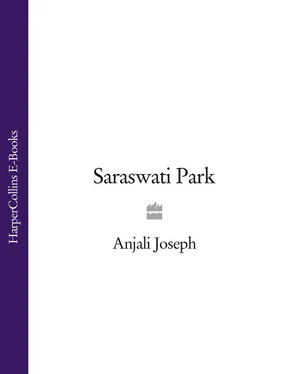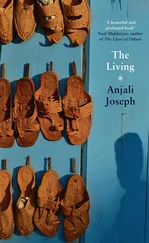As he crossed the circle he remarked again the bizarre advertisements for the limb replacement clinic that sponsored the garden in the middle of the road. Three other men were waiting at the tiny snack shop that had recently opened and begun to sell idlis in the morning. Because it was the first Sunday since Ashish had arrived he bought jalebis too. When he got home, the brittle coils of fried translucent dough, sticky with syrup, sat in a tangle on a plate at the edge of the table, waiting for Ashish to wake up. Mohan boiled the new milk, hummed, and made tea for three.
Satish’s fingers were precise and long. They undid the package, carefully detaching the tape from the paper, which was dark blue with golden stars printed on it. He was sitting in the cane armchair; in this moment it had come to resemble a throne.
‘Oh, an alarm clock!’
Lakshmi’s face shone and then trembled slightly. ‘You said yours had stopped working,’ she said.
‘Oh, that old thing,’ Satish said. His voice conveyed that the clock had been incalculably precious to him, and was irreplaceable. He held up the plastic box that contained the new one, which was silver and sleek, with a white analogue face.
‘Such a nice new clock,’ he said. The glow from his sister’s face returned. ‘Looks expensive,’ he went on.
‘No no,’ said Lakshmi, rather proudly.
‘So many functions.’ He turned the box at arm’s length to peer at the lettering on the back. ‘What’s this: snooze?’
‘Yes, and you can also set it to ring at the same time every day.’ She reached out to indicate a button on the side.
‘Almost too nice to use,’ said Satish decisively. He seemed to be talking to himself, but his voice was quite audible. Mohan, who had been standing near the chair to witness the small ceremony, felt the familiar mix of emotions that his brother-in-law so easily aroused: he wanted to hit him, but he also felt like laughing, so neatly had Satish turned the situation around. But then there was his wife’s face. Mohan became aware of an insect buzzing increasingly loudly as it banged against the glass of the balcony door; he reminded himself not to speak, and drifted towards the kitchen as though to check on something.
Behind him, he heard Satish’s soft, educated voice: ‘Yes, it’s too good for an old bachelor like me. You’d better keep it here, I wouldn’t know how to look after it.’ As Mohan went into the kitchen he turned and saw his wife’s face, which was shocked, like a child’s after it has been slapped. Ashish had gone to the balcony and was using his slipper to try to flick the insect, still buzzing irately, off the glass door and into the warm afternoon.
‘The daal is interesting,’ Satish said. Lakshmi began to smile. ‘Completely tasteless,’ her brother mused. ‘I wonder how you managed it.’ Her face darkened, and she looked down at her plate without appearing to see it.
It entered Mohan’s head to say, ‘If you don’t like the food, get out of my house and don’t come back.’ He didn’t, though; such a spat with Satish’s elder sister’s husband had left him unable to visit her house until she died five years later.
‘Give me the daal,’ Mohan told Ashish instead. He helped himself to more and continued to eat in silence, thinking about Satish and what had become of his early promise. He’d been exceptionally bright as a young man, but his father had favoured the elder children, and Lakshmi, who was the youngest. The crowning injustice had been when Satish, after graduating, had got a job with a British-run textile company. His father had told him to give the job to the eldest brother, Bhaskar, who hadn’t, anyway, kept it for long; he was indolent and good-natured and had married and moved to Nagpur, where he became a college lecturer. It was an incredible story, Mohan reflected, working the daal into the heap of rice on his plate. It was hard to imagine such a thing happening today. Which employer, for one thing, would hire one brother but accept another as substitute? He squeezed a little lime onto the rice and daal mixture, and sprinkled salt over it. At some point Satish’s hopes had given way to sourness; he had never married, and after he retired from his own post as a lecturer in law, seemed to spend his time devising small ways of upsetting his siblings.
To Mohan’s surprise, Ashish began to talk. The boy smiled at Satish who, caught off-guard, smiled back. ‘Satish uncle, I was reading in the newspaper about that case of a Hindu Undivided Family where one of the married daughters changed sex to become a son, what do you think about it?’
Satish laughed; his face became quite attractive. ‘So you read the newspapers, is it? That’s more than many law students seem to do. Well, it’s an interesting case, since there doesn’t seem to be a precedent at this level. But if we go back to the basic concept of the HUF there are two main considerations –’ and he went on talking for some time, while Ashish nodded, his face intelligent.
Mohan chewed a mouthful – the daal wasn’t tasteless, it was comfortingly bland – and thought of the flat in Grant Road where Satish lived. This was where he’d return after spending the afternoon and early evening with them. Mohan had been to the place some years earlier; it was in a dingy building, not very far from the post office, and more resembled a chawl, a workers’ tenement, than a modern apartment block. The main room contained some books, jostling for space in and on top of the shelves, and a steel cupboard for papers and clothes. There was a desk, and a dusty wooden chest of drawers topped with a newspaper, a comb, a hair brush, Satish’s steel watch. The bed was narrow. There had been a sense of monasticism in the place, but without any of the rich stillness that might imply. ‘This is a room a man might kill himself in,’ Mohan had thought, surprising himself.
There was a pause in the conversation. Satish had rounded off his explanation, Ashish had made a joke, and both their faces were flushed with amusement. Mohan pushed a jar towards his brother-in-law. ‘Lime pickle?’ he said. Their eyes met.
Satish smiled – he had, after all, a charming smile – and reached out a thin hand. ‘Thank you,’ he said.
In the evening, Mohan sat in the circle of light from the hundred-watt bulb above the cane armchair. Become a Writer lay on his lap, unopened. He remembered the pitiable face – dark, thin, desperate – of the man he’d bought it from. A few days later, Mohan had been in a bus on Marine Drive when he’d seen what appeared to be the same man, standing on the parapet and looking down at the waves. The wind blew the white clothes around his thin figure. Noon: it was blindingly hot. As the bus passed, the man had half turned. He’d seemed to see Mohan, and their gaze had held for a moment. Don’t jump, the letter writer had thought. Then the bus hugged the curve of the road, and the man was no longer in view. There was no way of knowing whether he had stepped back, onto the pavement, or forward, onto the rocks.
When Mohan had seen the book last Sunday in Ashish’s room he’d had the feeling that something big was about to happen, and with it, something bad. Neither of these things was negotiable, so it should have been obvious that it was pointless to think about them. He ran his mind over all the usual augurs: the train notice boards, the advertisements in the compartment, the faces of the other passengers and of his customers in the last few days, even the toys being sold on the street stalls. But he remembered nothing remarkable. Instead he found himself thinking of his father, at his desk on a Sunday, that inviolable time; his white shirt very white against the dim room, and books gathered on the table around him. Maybe Ashish had been right; maybe Nandlal kaka hadn’t known what he was talking about; maybe Mohan’s father could have published his stories?
Читать дальше












